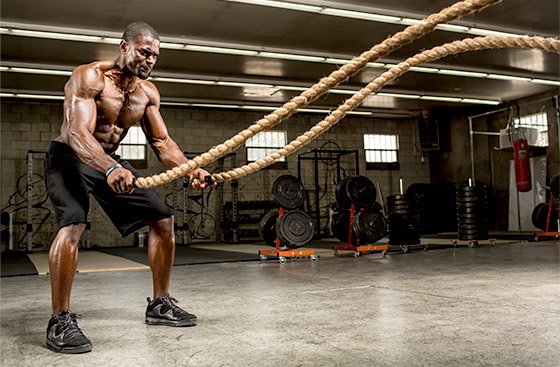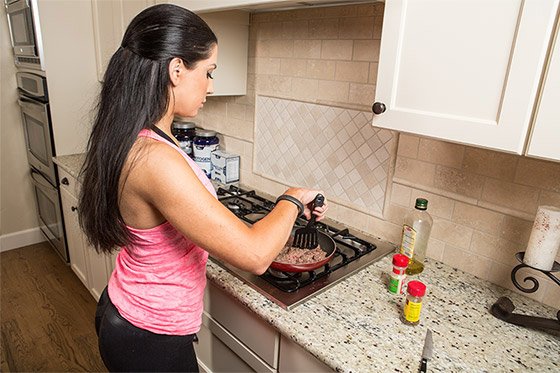
7 Signs Your Transformation Will Fail
Nobody said transforming was easy. Don't let these fitness fantasies cloud your view.
Nobody likes the F-word. No, not that F-word. Everybody likes that one. I'm talking about... failing.
On average, more than half of the people who express New Year's fitness goals end up as statistics, not success stories. They drop off by the second week, and end up shelving their goals until next year.
That's a huge problem that hits close to home for us here at Bodybuilding.com. To separate yourself from the masses, heed the warning signs early and face this reality head-on.
1
Your fitness fantasy is too vivid
As someone who spends a good chunk of my day reading transformation stories and looking at before-and-after photos, I know how totally inspirational other people's successes can be.
A powerful story like this one pretty much inevitably gives you a tingle in your muscles. All of a sudden, you start hearing clinking iron off in the distance. You picture yourself noshing on celery sticks and baby carrots while going all Texas Chainsaw Massacre on your pantry, because you're committed, dammit!
Slow your roll, bro.
While this spark of go-getting is awesome, the trouble starts when you begin weaving together a fantasy of your perfect workouts, perfect meals, perfect discipline, and your seemingly inevitable march toward fitness glory. In your head, everything happens in a rose-colored sheen, but the reality is very different. Things simply never go as planned.
Instead of spending all day in your head thinking about where you'll end up, spend more of your time mulling the major obstacles standing in your way. How you deal with those will determine how far you're able to go.
2
You have an unrealistic plan
You know you have to start working out. But because you work 9-5 and have to get home to be with your family, your exercise time fits into a harrowingly narrow window. You'll need everything to go perfectly with the program you've chosen. No traffic, no lines at equipment, and running to and from the locker room. Ready ... go!
(Sad trombone sound as you fail miserably.)
On second thought, maybe you could work out in the morning while everyone is still asleep. Good idea! But you also have a habit of snoozing for about 15 minutes, taking 20 minutes to navigate your bathroom routine, another 10 to get dressed, 8 minutes to get coffee going, and 15 more to get out the door. And let's not forget the ample time for device-checking at all points in between.

I think we've discovered some fat that could be trimmed from your day. It might suck at first, and it will definitely require you to start planning the night before and probably going to bed earlier. Excessive? Nope, just realistic.
Sometimes you simply have to plan it to that level of detail. Know your schedule and lifestyle, and set a plan of attack to work with them—not against them.
3
You misunderstand "after"
A picture may be worth a thousand words, but 950 of them might as well be lies. What did the person have to sacrifice to reach that crazy level of leanness? That winning smile and those poppin' abs aren't going to tell you. What sort of mindset shifts and drastic behavioral changes did he or she experience? You don't know.
Photos don't reveal the personal struggles and genuine lows that come with making an immense life change. People are quick to point out the benefits—as they should—but in most cases, the details about the costs to their short-term quality of life are glossed over.
That's to say nothing of the possible effects of lighting, last-minute dieting, the style and color of clothing, camera angle, PhotoShop—you name it, there are a ton of ways to enhance an after photo.
Certainly, an inspiring image still has value as a way to spark conversations about the changes that need to be made. However, you've got a long way to go before you really need to think in those terms. Make your "after" more realistic, and update it once you get there.
4
You want change to feel easy
In your fantasies, your workouts resemble a Rocky montage, and your diet is on-point and delicious all the time. Since I'm in the habit of bursting bubbles, allow me to stick a pin in yours. Transformation ain't no happy-fun time, at least most of the time.
If you're transitioning from an unhealthy lifestyle to a healthy one, the process is largely uncomfortable, at least for a while. You experience muscle pain that keeps you limping for days, nothing tastes like you want it to, and you sometimes struggle to meet rep ranges with even the most humiliating of weights.

The good news is that this discomfort is completely normal and part of the process. In fact, it's necessary to help you understand that the process is, you know, a process. It'll get better, but definitely not today. Tomorrow doesn't look good, either. Maybe check back six weeks from now, mkay?
That doesn't sound fun, but it's the truth. Put in the effort, and your story will be rich with heroism, pain, humiliation, triumph, and all of that amazing stuff that makes us human.
5
Your timeframe is unrealistic
So you read somewhere that Female Celebrity X lost 28 pounds in 30 days. Props to her, but here are two big reasons not to get excited about her plan.
First, she makes a living off of the way she looks. This means she probably has ample time in her daily schedule to train, with a coach guiding her through every workout. Then there's the nutritionist, the personal chef, and a food budget that would make your head explode like an egg in a microwave. Plus, you have no idea how healthy she is—or how good she feels. Who knows about the secret extreme measures that may have been taken to meet a deadline?
And second, someone else's progress is a poor metric to gauge how your own body will respond to dramatic changes such as calorie deficits and intense training. What took someone else 12 weeks to accomplish could take you a year. Seriously.
6
You expect your body to behave like a
predictable machine
Ahem (points ruler at chalk board). Studies say carbohydrates interact with X, protein affects Y, and fat does Z in your body. Got that?
Except we don't eat carbohydrates, protein, and fat. We eat food! And likewise, we don't just "work out." We stimulate reactions in multiple complicated, interrelated, physiological systems. I don't even want to pretend I can grasp everything that's going on.

Nothing happens in a vacuum. You've got your own lifestyle, habits, diet history, training history, and eating preferences all playing a part. Each one can and will affect how your body changes in response to new stimuli.
The takeaway? Don't sweat it. Just work with it. Your body isn't straight out of an anatomy textbook, but with enough time and effort, you can achieve a lot without understanding exactly why.
7
You've overcommitted
I'm not talking about having too many events on your schedule here. I'm talking about leaping into an all-or-nothing mentality, when that has little resemblance to the way you've been living up this point.

This year, commit to less. Make small changes you know you can manage without clawing your eyes out. Rather than cutting out all processed foods, start by cooking one or two more meals per week at home, and making healthier choices when you eat out. Rather than overselling yourself on six days a week in the gym, aim for three days or three 30-minute walks a week.
Find the sweet spot of intensity—both in the gym and out—and you'll see changes more quickly—and more consistently—than with an extreme approach. Your journey is your own, but I want to help you sustain it for a lifetime!
Recommended For You

Our Athletes Reveal Their 2015 Resolutions
These Bodybuilding.com athletes shared their 2015 resolutions. What are yours?
15 Fit Tips For 2015
Arm yourself with these tips to make 2015 THE year you reach your goals once and for all.
